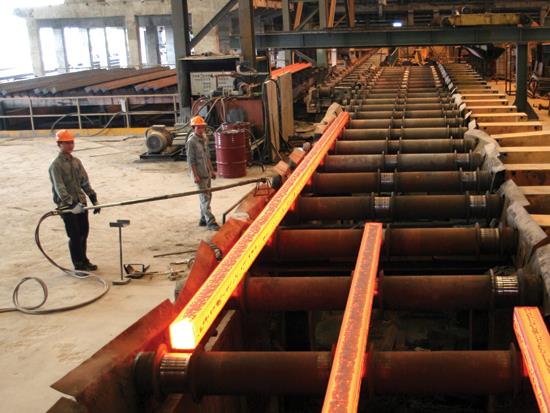INDOCHINA INTERNATIONAL CONSULTING CO., LTD
HO Add: 62L/36 Nguyên Hồng, Ward 11, Bình Thạnh District, HCMC - Vietnam
Biz Office Add: #48 Road No 11, Quarter 6, Hiệp Binh Chánh Ward, Thủ Đức, HCMC - Vietnam
®Source: http://viipip.com should be clearly quoted for any use of information extracted from our website.
Publication permit No: 60/GP-TTĐT , April 05, 2010.


In early June, a number of steel manufacturing firms (both local and foreign joint ventures) signed and sent a proposal to the Vietnam Steel Association (VSA), claiming that the government decision to prohibit iron ore exports was detrimental to their performance.
According to the proposal, the main reason behind steel firms’ poor performance was not economic difficulties or the flat lining property market but primarily because of the block on exports.
The signatories said that only one firm, leading steel maker Hoa Phat Group (HPG), benefited from the policy, while most others were in doldrums.
“The ore price in the domestic market has declined sharply, from VND2,200 per kilogram to only VND1,200 per kilogram, a half of that of the world market and entirely due to the government’s decision, Naturally, mining sites have been put in a fix with sliding incomes and these price differences have mostly benefited HPG, which is the leading buyer in the market,” the proposal claimed.
The steel firms also said that “HPG proposed banning ore exports and promised to buy processed ores at a price at least equal to that of the export price. Now it’s buying them at half the world price, directly against its pledge.”
“With material prices only half of what other firms spend on input materials, as they mainly buy steel scrap, HPG has manipulated the market and driven steel firms into hardships,” the proposal noted.
In fact among leading steel makers, only two firms – Thai Nguyen Iron and Steel Corporation (Tisco), also a top player, and HPG – are using blast kilns for ore processing while the rest import scrap for processing.
While Tisco mainly sources ores from mining sites under its management, HPG is the leading buyer of iron ores in the domestic market, so it is clearly the biggest beneficiary of the government decision to ban ore exports.
Last year Tisco turned out 386,619 tonnes of steel billet, 197,629 tonnes of blast-kiln iron, 484,078 tonnes of rolled steel and had reported revenue of VND7.478 ($356 million). But the firm still suffered VND288 billion ($13.7 million) in losses.
This year Tisco has projected turning out 190,000 tonnes of blast-kiln iron, 410,000 tonnes of steel billet, and 596,000 tonnes of steel with a modest profit of VND35 billion ($1.6 million).
With about 9 per cent of rolled steel market share, Tisco currently ranks third behind Pomina and HPG, according to the VSA ranking.
Meanwhile, HPG’s market share jumped from 13.7 per cent in 2012 to 15.2 per cent by late 2013.
Last year the firm scored 12 per cent and 95 per cent growth in its revenue and after-tax profits with VND19.2 trillion ($914 million) and VND2.01 trillion ($95.7 million), respectively.
In steel production and related business, the group posted VND1.668 trillion ($79.4 million) in post-tax profits, more than double that of 2012’s VND730 billion ($34.7 million).
- FDI capital continues to pour into Vietnam (6/11/2025 1:20:33 PM)
- Thanh Hoa receives good news: Preparing to have an additional industrial park of up to 470 hectares, creating jobs for nearly 30,000 people (6/11/2025 1:15:09 PM)
- Industrial Park Real Estate: Waiting for the New Generation of FDI (6/11/2025 1:10:15 PM)
- A wealthy Vietnamese city will have two special economic zones after the merger (6/11/2025 1:04:42 PM)
- 30 billion USD capital FDI in Việt Nam by 2025, a series of "ông big" races to expand the land fund (6/11/2025 12:55:26 PM)
- the 2nd largest city in the North will start construction on an international economic zone (6/11/2025 12:50:20 PM)
- Japanese giant Sumitomo continues to want to build an industrial park in the countrys fourth smallest province. (6/11/2025 12:40:45 PM)
- 3 foreign corporations want to invest billions of dollars in Ba Ria - Vung Tau (6/11/2025 12:34:30 PM)
- Lotte Group member starts construction of nearly 1,000 billion VND logistics center in the province with the most industrial parks in Vietnam (6/11/2025 12:33:26 PM)
- Forming a regional center for manufacturing spare parts and components (6/11/2025 12:24:08 PM)
- Vietnams first wafer factory is about to start construction (6/11/2025 12:19:09 PM)
- Dong Nai attracts foreign investors (6/11/2025 12:13:27 PM)
- Tay Ninhs largest industrial park welcomes a $150 million high-end knitted fabric factory project (6/11/2025 12:11:00 PM)
- (6/11/2025 12:09:10 PM)
- Vietnam will become a destination for Chinese investors in the future (11/6/2023 1:03:19 PM)

- FDI capital continues to pour into Vietnam
- Thanh Hoa receives good news: Preparing to have an additional industrial park of up to 470 hectares, creating jobs for nearly 30,000 people
- Industrial Park Real Estate: Waiting for the New Generation of FDI
- A wealthy Vietnamese city will have two special economic zones after the merger
- 30 billion USD capital FDI in Việt Nam by 2025, a series of "ông big" races to expand the land fund










 ADB: Vietnam’s 2009 GDP growth to be highest in South East Asia
ADB: Vietnam’s 2009 GDP growth to be highest in South East Asia MGM Grand Ho Tram: Vietnam’s First ‘Las Vegas Style’ Integrated Resort
MGM Grand Ho Tram: Vietnam’s First ‘Las Vegas Style’ Integrated Resort Nha Trang’s Twin Towers project licenced
Nha Trang’s Twin Towers project licenced Foreign investors still have good opportunities in Vietnam
Foreign investors still have good opportunities in Vietnam Sierra Wireless gets a foot in Vietnam’s ICT market
Sierra Wireless gets a foot in Vietnam’s ICT market